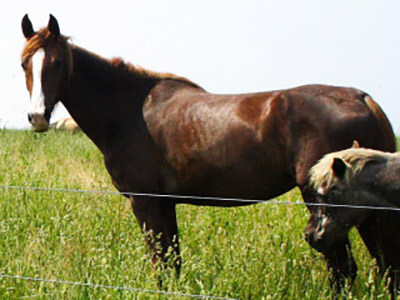Nutrient Management
Nutrient Management Affects Our Environment.
Both the community and the farmer benefit from the proper management of nutrients on the farm. There is a balance between applying nutrients that crops need to be productive and not over applying nutrients that leads to runoff into our streams, creeks, and rivers as well as affecting our groundwater.
What is a Nutrient Management Plan?
A nutrient management plan is an inventory of nutrient sources on the farm, including manure and crop residues, along with the nutrient analyses of each of these sources. The planned crop rotation is included, along with soil tests, which are essential to determine the nutrient needs of the crops. A plan and procedure for applying the nutrient source(s) to the crop fields is included to maximize the economic benefit and minimize the environmental impact of the nutrients. Resource concerns are identified and best management practices are planned that, when implemented, will minimize the potential for nutrient loss from the fields and/or headquarters. Additional nutrient crop needs and plans for the handling of any excess manure are also included.
DEP regulations require that all manure storage structures (liquid or semi-liquid) built in PA after 2000 have to be certified by a professional engineer.
Who needs a plan?
Any operation that generates manure including; farms that land apply manure or agricultural process wastewater, farms managing Animal Concentration Areas like barnyards or feedlots, and farms that pasture animals. Use our Animal Equivalent (AEU) Calculator at the bottom of this page to see what type of nutrient management plan you are required to have.
Types of Plans
ACT 38 Nutrient Management Plan
The Nutrient Management Act (Act 38) is a Pennsylvania law that regulates Concentrated Animal Operations (CAOs). CAOs are agricultural operations where the animal density of all livestock, including non-production/recreational animals, on the farm exceeds 2 animal equivalent units (AEU’s) per acre on an annual basis. An operation with less than 8 AEU’s is not considered to be CAO regardless of animal density. CAOs are required to maintain a current Act 38 nutrient management plan with annual reviews. This program allows for operations to participate as a Volunteer Animal Operation (VAO). By being a volunteer and actively following the plan, the State Conservation Commission provides some limited liability for your operation in the case of manure mishandling compliant. Click here to visit the PA Act 38 Nutrient Management Website
590 Nutrient Management Plan
A 590 NMP meets the Natural Resourses Conservation Service (NRCS) standard for nutrient management, and is required when receiving technical assistance from the District or NRCS relating to manure handling (manure storage’s, barnyards, etc.) This document looks very similar to an Act 38 Nutrient Management Plan (NMP), with a few minor differences such as liming recommendations. Because a 590 NMP is phosphorus based, it meets the requirement for a Manure Management Plan required by state regulations.
Manure Management Plan
Pennsylvania Chapter 91 requires that all farms in Pennsylvania, regardless of size, that produce or land apply manure or agricultural process wastewater, develop and follow a written Manure Management Plan (MMP). Farms already regulated as a CAO or CAFO are not required to develop these plans. The standardized Manure Management Manual should be the template for writing a MMP. No certification, review, or submittal is required to write a MMP, and it can be completed by the farmer. However, a MMP must be able to be produced upon request by the operator. The Department of Environmental Protection enforces regulations pertaining to MMP development and implementation. Click to see Manure Management Planning Information
Nutrient Balance Sheet
Nutrient Balance Sheet’s (NBS’s) are used to export manure from one farm to another. They can be used in the Act 38 Program or they can be used to export manure between a non-Act 38 farm to a non-Act 38 farm. The Nutrient Balance sheets can also be used to refine a manure application rate rather than using the Manure Management Plan manure application charts. A Nutrient Balance Sheet cannot be used instead of a Manure Management Plan when livestock is housed on the operation. Click here to see NBS information for Manure Management Plans
IMPORTANT:
Commercial Planners List
LCCD staff does not write nutrient management plans. If you are in need of assistance, you may contact a private consultant to write your nutrient management plan.
Ag Plan Reimbursement Program
The Lancaster County Conservation District, in cooperation with the Pennsylvania Association of Conservation Districts (PACD) is administrating a program to provide financial assistance to those who hire private consultants to develop their Agriculture Erosion & Sedimentation Control Plans (Ag E&S Plans) and/or their Manure Management Plans (MMPs). Please access the link below for more information and the application. The plan(s) and the application for agriculture operations located in Lancaster County, Pennsylvania are to be submitted to Jason Reuter via email at jasonreuter@lancasterconservation.org OR you can mail it to:
Jason Reuter
Lancaster County Conservation District
1383 Arcadia Road, Room 200
Lancaster, PA 17601
If you have any questions about the application submission process, you may call Jason at 717-874-2561
All Operations with Animals Need a Plan
What Type Do I Need?
The CAO Calculator has been updated to reflect the change in animal weight effective October 1, 2020.
To determine if your agricultural operation is a Concentrated Animal Operation, refer to Penn State University’s Agronomy Facts Sheet 54
The Lancaster County Conservation District can also assist you in determining if your agricultural operation is a CAO.

Lancaster County
Conservation District
1383 Arcadia Road
Room 200
Lancaster, PA 17601
Business Hours
Monday through Friday
7:30am-4:00pm
Phone:
(717) 299-5361 ext. 5
Fax:
(717) 299-9459
Follow us:
Copyright © 2024 Lancaster County Conservation District | All rights reserved. | Website by Albright Design Studio LLC
Financial support for website design provided by Arconic Foundation

